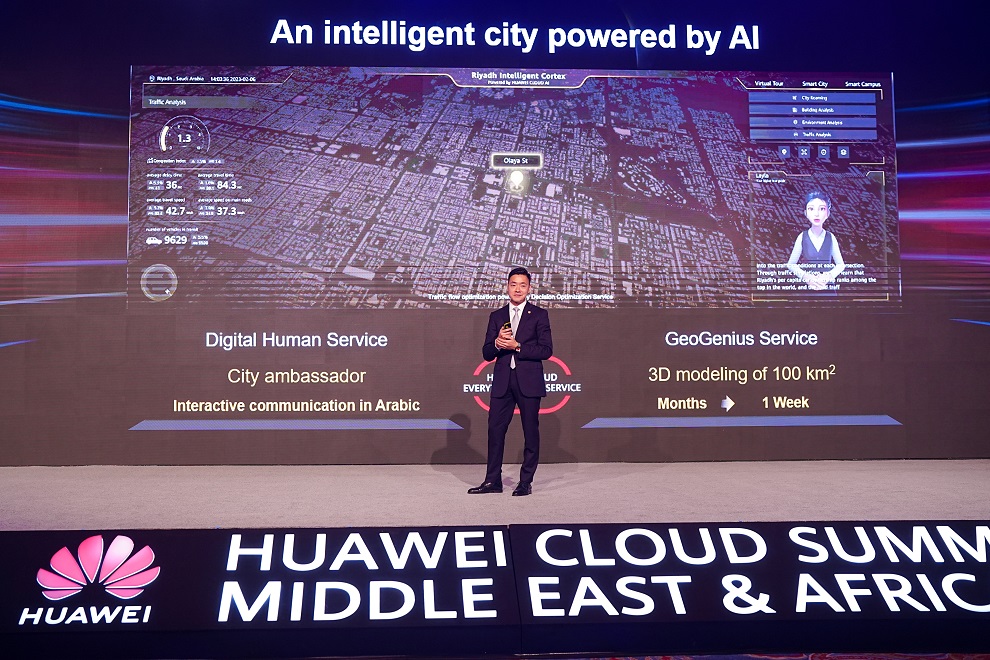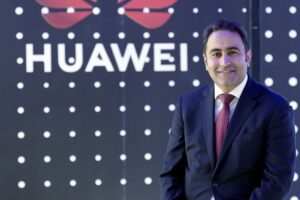Frank Dai, President, Huawei Cloud Middle East & Central Asia speaks to Teletimes International
Interview by: Khalid Athar
Today, the digital economy is at the forefront of the national development plans of many countries in the Middle East. Nations such as Saudi Arabia, United Arab Emirates, Qatar, Kuwait, Oman, Bahrain, among others in the region have not only made the digital economy a cornerstone of their future national development, but also introduced various digital-specific strategies to boost digital transformation and achieve their visions.
During the Huawei Cloud Middle East & Africa Summit that was held in Dubai on Mar 21, Teletimes International had the chance to interview Frank Dai, President of Huawei Cloud Middle East & Central Asia who has been resident in ME for more than 10 years. During the interview, he highlighted how the technology innovation is driving the growth of the digital economy in the Middle East & discussed how to leverage cloud in order to build and boost a robust digital economy.
- Khalid Athar: Huawei recently held the Huawei Cloud Summit Middle East & Africa 2023. Please elaborate.
Frank Dai: We held the Huawei Cloud Summit Middle East & Africa 2023 on March 21 in Dubai, the second time the flagship event for Huawei Cloud in the region is being held. With the theme of “Inspire Innovation with Everything-as-a-Service”, the summit gathered industry leaders and included keynote speeches and forums focused on the topics of how cloud tech promotes digital transformation in various industries and the digital economy in the Middle East, the future of Fintech and multiple initiatives to co-build better ecosystems to help startups to innovate and grow, among others. Besides, the event provided a platform for the region’s valuable customers to exchange insights based on market opportunities and successful experiences.
Huawei is translating the company’s 30-plus years of ICT know-how into cloud innovations
During the summit, a joint launch of the Huawei Cloud Startup Program for Middle East, Central Asia, and Africa was also held. Joining in the launch ceremony were representatives from the UAE Ministry of Economy, Dinarak (a licensed payment services provider from Jordan), Ignite (a VC firm from Pakistan), and Eyon TV (startup representative from Kuwait). Through three key initiatives — innovative cloud platform, entrepreneurship enablement, and business resources — Huawei Cloud will provide lifecycle support for startups in the Middle East, Central Asia, and Africa. Huawei Cloud is committed to building a global startup ecosystem to empower 1,000 local startups to innovate and grow on Huawei Cloud in the next three years.
To make further technological contributions to the implementation of cloud technologies and the development of the digital potential of the Republic of Uzbekistan, on May 23, 2022, Huawei signed a memorandum of understanding with the E-Government Project Management Center. In August 2022, Huawei also launched a national data center in Uzbekistan for e-gov. At the end of 2022, Huawei and the Ministry of Digital Technologies jointly held the Data Center and Cloud Forum.
- K.A: Would you like to talk about the Huawei Cloud strategy for 2023?
F.D: Huawei Cloud approach is all digital, all cloud, AI-driven, and providing Everything-as-a-Service: Infrastructure-as-a-Service, Technology-as-a-Service and Expertise-as-a-Service. Through the ‘Everything-as-a-Service’ model, Huawei is translating the company’s 30-plus years of ICT know-how into cloud innovations.
We encourage enterprises to embrace AI fully and let data play its part in supporting operational decision-making as part of Technology-as-a-Service
The Huawei Cloud Everything-as-a-Service proposition envisions a future where all infrastructure and applications will be cloud-based. We encourage enterprises to embrace AI fully and let data play its part in supporting operational decision-making as part of Technology-as-a-Service. Therefore, as the intelligent world develops, the right strategy should be all-digital, all-cloud, AI-driven, and everything as a service. We are also working to make AI more affordable, accessible, and as available as possible and help cultivate a new, thriving AI ecosystem.
In 2023, Huawei Cloud will continue expanding its global presence. With partners, Huawei Cloud operates 78 Availability Zones in 29 Regions, including UAE and the upcoming Saudi Region, Egypt region. In July of last year, Kuwait’s Communication and Information Technology Regulatory Authority (CITRA) permitted Huawei Cloud to offer cloud services in Kuwait as the GCC country pursues a cloud-first policy. Additionally, Huawei Cloud and Omantel are working together to build Oman Cloud to support the country’s cloud-first policy in support of Oman Vision 2040.
- K.A: How is Huawei Cloud helping to develop the metaverse?
F.D: Gartner predicts that by 2026, 25% of people will spend at least one hour a day working, shopping, studying, socializing, or being entertained through the metaverse. In addition, it expects that 30% of companies and organizations worldwide will have metaverse products and services. Such massive metaverse applications will lead to an explosion in data. Data processing and analysis in centralized data centers cannot meet all service needs and can cause partial network congestion, making it necessary to process metaverse services at the edge. To empower the metaverse, we will therefore work with our carrier partners to build edge data centers (DCs) and networks to inspire immersive experiences for their customers.
5.5G will usher in a new era for cloud applications, creating new opportunities for network connectivity
Metaverse comes with data explosion, leading to a greater demand for compute capacity. Cloud computing combines both hardware and software, making it the key building block for the metaverse. Metaverse needs computing, storage, machine learning, and many other capabilities. All of these are on cloud. For example, you need significant compute capacity to model and render buildings in the metaverse, get timely feedback, or reduce game latency. Stronger computing means better user experience. Therefore, metaverse and cloud computing will feed on each other.
- K.A: What will be the role of Huawei Cloud when 5.5G starts getting adopted? Are you geared to handle all the data that will be generated through 5.5G?
F.D: At MWC Barcelona 2023, Huawei showcased leading technologies, new business opportunities, and industry progress in the 5.5G era. The company aims to work with carriers and industry partners worldwide to further the evolution of ICT infrastructure, lay the foundation for the 5.5G era, and build on the success of 5G for even greater prosperity. At the event, Huawei presented five major characteristics of the 5.5G era: 10 Gbit/s experience, all-scenario IoT, integrated sensing and communication, Level 4 autonomous driving network, and green ICT.
5.5G will usher in a new era for cloud applications, creating new opportunities for network connectivity as cloud-based and multi-cloud enterprise applications become even more important for enterprises. 5.5G caters to cloud applications’ need for real-time, reliable, and easily-accessible connectivity, bringing new opportunities to transmission networks, whether between edge cloud nodes, between edge cloud nodes and central clouds or between enterprises and the cloud.
















